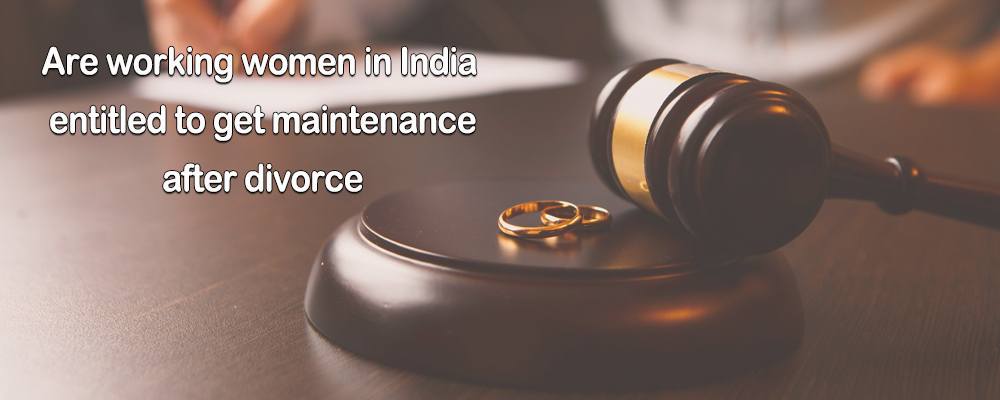In India, the concept of maintenance after divorce is governed by the provisions of the Hindu Marriage Act, 1955, the Special Marriage Act, 1954, and the Code of Criminal Procedure, 1973. The entitlement to maintenance, commonly known as alimony, is not exclusive to working women but can be claimed by any spouse who is unable to support themselves financially after divorce.
According to Indian laws, both husbands and wives have a legal obligation to provide financial support to each other during the marriage and even after divorce, depending on the circumstances. Maintenance is awarded to ensure that the spouse who is unable to sustain themselves due to various factors receives adequate financial assistance.
The factors considered for determining maintenance after divorce include:
Financial status
The court takes into account the income, earning capacity, property, and financial resources of both parties. If a working woman can demonstrate that her income is insufficient to meet her basic needs, she may be eligible for maintenance.
Standard of living
The court considers the standard of living enjoyed by the couple during the marriage. If a woman is accustomed to a certain lifestyle but lacks the means to sustain it after divorce, she may be granted maintenance to maintain a similar standard of living.
Age and health
The age and health of the spouse seeking maintenance are taken into consideration. If a working woman is elderly, suffering from an illness or disability, and unable to earn a sufficient income, she may be entitled to maintenance.
Need A Legal Advice
The internet is not a lawyer and neither are you. Talk to a real lawyer about your legal issue

Child custody
If there are children from the marriage, their custody and the associated financial responsibilities are considered when determining maintenance. The spouse who has custody of the children may receive additional financial support.
Employment status
While being a working woman does not automatically disqualify someone from receiving maintenance, the court assesses the employment status and earning capacity of the spouse. If a woman is employed but earns significantly less than her former spouse or faces difficulties finding suitable employment, maintenance may be granted.
It’s important to note that the actual amount of maintenance awarded varies from case to case and is at the discretion of the court. The court considers the specific circumstances, the needs of the spouse seeking maintenance, and the financial capacity of the other spouse while making a decision. Maintenance can be granted as a lump sum or as monthly or periodic payments.
It is advisable for individuals seeking maintenance after divorce to consult with a lawyer who specializes in family law to understand their rights and obligations specific to their situation and jurisdiction. Laws related to maintenance may differ for different religious communities in India, so it is important to consider the applicable personal laws as well.
The provisions for maintenance in India are primarily outlined in the following legislation:
Section 24 of the Hindu Marriage Act, 1955
This provision allows either spouse, including a working woman, to claim interim maintenance during the pendency of divorce proceedings. The court has the power to grant maintenance to the dependent spouse if it is satisfied with the financial needs and capacity of the other spouse. The amount awarded is determined based on the facts and circumstances of the case.
Section 25 of the Hindu Marriage Act, 1955
This provision deals with permanent alimony or maintenance after the divorce decree has been granted. It allows either spouse, including a working woman, to apply for maintenance if they can demonstrate that they are unable to support themselves. The court takes into account factors such as the financial position and earning capacity of both spouses, their conduct during the marriage, and other relevant factors to determine the amount and duration of maintenance.
Section 36 of the Special Marriage Act, 1954
This Act applies to marriages where either spouse belongs to a different religion, and it provides for the maintenance of either spouse after divorce. The principles and factors considered for determining maintenance are similar to those mentioned under the Hindu Marriage Act.
Section 125 of the Code of Criminal Procedure, 1973
This provision applies to all Indian citizens, regardless of their religion. Under this section, a wife, including a working woman, who is unable to maintain herself can claim maintenance from her husband. The wife has to establish that her husband has the means to provide maintenance but neglects or refuses to do so. The court can order the husband to pay monthly maintenance to the wife.
It is important to note that the amount of maintenance awarded may vary depending on the specific circumstances of each case, and it is at the discretion of the court. The court considers factors such as the income, earning capacity, financial resources, and standard of living of both parties while making a decision.
Additionally, maintenance can be modified or terminated based on changes in circumstances such as remarriage, employment, or the financial status of either party. It is advisable for individuals seeking maintenance to consult with a lawyer who specializes in family law to understand the provisions applicable to their specific situation and jurisdiction.
If any person in need wants any kind of assistance for their matrimonial dispute, they can contact Lead India, where they can hire the best advocates, ask a free question, and take expert advice from our experts.





 Talk to a Lawyer
Talk to a Lawyer